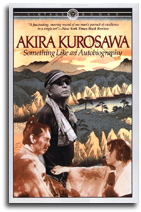Books |
Akira Kurosawa: Something Like An Autobiography
By
Published: Mar 22, 2022
Category:
Biography
You love so many of his movies.
Star Wars, of course.
The Magnificent Seven.
That first great Clint Eastwood western, A Fistful of Dollars.
And, most recently, A Bug’s Life.
No, Akira Kurosawa didn’t really direct those movies.
But he wrote and directed the films that inspired other directors to make those movies. ("Inspired" is polite; in some cases, the films other directors made were close copies of Kurosawa’s stories and themes.) And the films that Kurosawa did make — Rashomon and The Seven Samurai, most notably — are sufficiently miraculous for critics and audiences alike to regard him as one of the greatest filmmakers of all time.
We say we read the memoirs of prominent men and women because we want to understand them better. But that’s just part of the attraction. We are also, I thinking, looking for clues. If they became famous and important and maybe even rich, perhaps we can pick up a trick or two from their experience — it’s just a matter of cracking the code, of getting beyond the cliches about "hard work" and "good luck."
In the case of a film director, the lure is even stronger. A successful director may have an artistic vision, but he must also have a compelling personality and a gifted salesman’s ability to close a deal. That’s a very modern job description. I don’t know about you, but what I do isn’t just about writing — it’s about marketing and branding and hustling to close a deal. Sometimes I think writing is the least of it.
In Kurosawa’s case, we begin by looking at a kid you may know well. Not rich. The class clown. Interested in everything, master of nothing. Impractical — though poor, he dreams of becoming an artist.
An important event: the Kanto earthquake, and the fire that followed. His older brother takes him on a walk through Tokyo. Burned corpses are everywhere. Akira wants to turn away.His brother forces him to look — and look closely. Akira learns: "If you shut your eyes to a frightening sight, you end up being frightened. If you look at everything straight on, there is nothing to be afraid of." That lesson alone is worth the price of the book.
Akira goes to lots of movies, reads cheap editions of the classics, listens to both Japanese and European classical music. He reads a book on Cezanne and steps outside: "Everything looked like a Cezanne painting." What to do with those disparate interests? His brother works in the movies, so he gravitates to film. And is hired as an assistant to a wise and mentoring director.
The memoir seems odd. The first half is mostly about school; the second concerns his slow rise to the director’s chair. In fact, the halves are brilliantly balanced — the real subject of the book is education, and how we find out who we are. [To buy ‘Something Like an Autobiography’ from Amazon.com, click here. To buy the Kindle edition, click here.]
The stories that Kurosawa tells have the quality of teaching stories; there’s a moral involved in most, and, to his credit, he doesn’t spell them out. Except once. His assistant directors do not grasp what Rashomon is about. Kurosawa urges them to read the script again. They say they have. So, reluctantly, he explains: "Human beings are unable to be honest with themselves about themselves….the human heart is impossible to understand."
Later, he offers an even more telling insight: "Although human beings are incapable of talking about themselves with total honesty, it is much harder to avoid the truth while pretending to be other people….I am certain I did. There is nothing that says more about its creator than the work itself."
Akira Kurosawa died in 1998 at the age of 88, having directed thirty feature films. Thirty thousand Japanese attended his funeral — including 5,000 people from the Japanese film industry itself. They knew: no one like him before, no one like him coming along.
That final tribute should make everyone who loves movies — but who knows mostly about American films — want to read this book. To say nothing of going back and seeing Kurosawa’s work.


